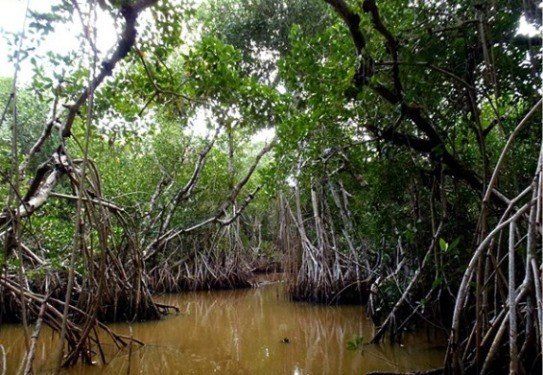Mangrove forests – traps for marine litter?
When we talk about mangroves, we usually think of a muddy, wet, and very humid habitat that is difficult to walk in. Although this is all true, mangrove forests provide us with so much more.
Mangroves are species of trees that have adapted very well to their environment. They are halophytes or salt-tolerant and survive well in their habitat. They cover about 132,000 km2 in tropical and subtropical locations, standing in the intertidal zone between the coast and land. They protect inland from waves and turbulence and possibly by trapping plastic objects that are being transported by the currents. We have all heard about the problem of our plastic waste ending up in the ocean, creating huge dumps in some areas due to the movement of the currents. But what a lot of people don’t know is that this is not the only plastic in our ocean. There is a lot of “missing plastic” that we produce and discard that ends up in the most remote places. One of those places are mangrove forests. Although mangroves are survivors, they only thrive when they have perfect conditions. Plastic debris can affect the trees and associated fauna by preventing gas exchange and releasing harmful chemicals that have been added to the plastic materials.
Scientists studied mangroves in the Red Sea and Arabian coast where there is high density of marine traffic. Surveys of the area found plastic bottles, plastic bags, oil containers, ropes and even food packaging(Martin et al., 2019).
The video below shows another example how litter gets easily trapped between the branches of mangrove trees:
The comparison between the distributions of plastic objects in Red Sea mangroves and beaches shows that large objects are twice as likely to get stuck in the mangroves than smaller objects.
They came to the conclusion that a lot of litter comes from marine traffic in the Red Sea. It can also be transferred from long distances by the currents. The trash then gets stranded in the high-density root system and can be potentially harmful to the mangroves and animals that live within. This study is one of many to demonstrate the urgency to reduce plastic consumption and educate how a plastic bottle that we buy today can be dispersed in the environment and reach even remote habitats. Once there, it can settle for a long time, taking as much as up to 1,000 years to decompose.
References:
Martin, C., Almahasheer, H., & Duarte, C. M. (2019). Mangrove forests as traps for marine litter. Environmental Pollution , 247 , 499–508. https://doi.org/10.1016/j.envpol.2019.01.067
SHARE THIS ARTICLE















